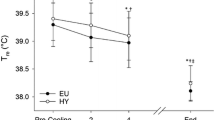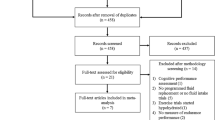Abstract
It is equivocal whether glycerol hyperhydration improves exercise performance and thermoregulation in the heat. The purpose of this study was to compare the effectiveness of glycerol with water hyperhydration, using a reliable, self-paced variable-intensity cycling protocol under hot, humid conditions. Seven moderately-to-well trained subjects ingested either a solution consisting of 1.2 g kg−1 body mass (BM) glycerol mixed with 21 ml kg−1 BM flavoured water (GLY) or placebo (PL), which was flavoured water of equal volume to the GLY trial, 2.5 h before exercise. Following hyperhydration, subjects undertook a self-paced, variable-intensity cycling protocol designed to simulate racing, with the aim being to cycle as great a distance as possible over 60 min. There were no differences in total distance cycled between conditions (29.7±5.7 km for PL, 28.9±5.7 km for GLY). Power output was not different at any time between conditions. Terminal rectal temperatures were 39.0±0.5 °C for PL and 38.8±0.7 °C for GLY and were not significantly different. Heart rate was significantly higher for GLY only during the high-intensity efforts. The sweat rate for GLY was 1.72±0.28 l h−1 (P<0.01) compared with 1.15±0.29 l h−1 for PL. It is concluded that glycerol hyperhydration has no significant advantage over water hyperhydration on performance or thermoregulation during a 1-h, variable-intensity exercise performance.






Similar content being viewed by others
References
Anderson MJ, Cotter JD, Garnham AP, Casley DJ, Febbraio MA (2001) Effect of glycerol-induced hyperhydration on thermoregulation and metabolism during exercise in the heat. Int J Sport Nutr Exerc Metab 11:315–333
Armstrong LE, Maresh CM, Gabaree CV, Hoffman JR, Kavouras SA, Kenefick RW, Castellani JW, Ahlquist LE (1997) Thermal and circulatory responses during exercise: effects of hypohydration, dehydration, and water intake. J Appl Physiol 82:2028–2035
Booth J, Marino F, Ward JJ (1997) Improved running performance in hot humid conditions following whole body precooling. Med Sci Sports Exerc 29:943–949
Borg GAV (1982) Psychological bases of physical exertion. Med Sci Sports Exerc 14:377–381
Buono MJ, Wall AJ (2000) Effect of hypohydration on core temperature during exercise in temperate and hot environments. Pflugers Arch 440:476–480
Burke LM, Hawley JA, Schabort EJ, St Clair Gibson A, Mujika I, Noakes TD (2000) Carbohydrate loading failed to improve 100-km performance in a placebo-controlled trial. J Appl Physiol 88:1284–1290
Candas V, Libert JP, Brandenberger G, Sagot JC, Amoros C, Kahn JM (1986) Hydration during exercise: effects on thermal and cardiovascular adjustments. Eur J Appl Physiol 55:113–12
Candas V, Libert JP, Brandenberger G, Sagot JC, Kahn JM (1988) Thermal and circulatory responses during prolonged exercise at different levels of hydration. J Physiol (Paris) 83:11–18
Dill DB, Costill DL (1974) Calculation of percentage changes in volumes of blood, plasma, and red cells in dehydration. J Appl Physiol 37:247–248
Fortney SM, Nadel ER, Wenger CB, Bove JR (1981) Effect of blood volume on sweating rate and body fluids in exercising humans. J Appl Physiol 51:1594–1600
Fortney SM, Wenger CB, Bove JR, Nadel ER (1984) Effect of hyperosmolality on control of blood flow and sweating. J Appl Physiol 57:1688–1695
Galloway SDR, Maughan RJ (2000) The effects of substrate and fluid provision on thermoregulatory and metabolic responses to prolonged exercise in a hot environment. J Sport Sci 18:339–351
Gleeson M, Maughan RJ, Greenhaff PL (1986) Comparison of the effects of pre-exercise feeding of glucose, glycerol and placebo on endurance and fuel homeostasis in man. Eur J Appl Physiol 55:645–653
Greenleaf JE, Castle BL (1971) Exercise temperature regulation in man during hypohydration and hyperhydration. J Appl Physiol 30:847–853
Guyton AC (1976) Partition of body fluids: osmotic equilibria between extracellular and intracellular fluids. In Textbook of medical physiology. Saunders, Philadelphia, pp 424–437
Hitchins S, Martin DT, Burke L, Yates K, Fallon K, Hahn A, Dobson GP (1999) Glycerol hyperhydration improves cycle time trial performance in hot humid conditions. Eur J Appl Physiol 80:494–501
Kay D Marino FE (2000) Fluid ingestion and exercise hyperthermia: implications for performance, thermoregulation, metabolism and the development of fatigue. J Sports Sci 18:71–82
Kay D Marino FE (2003) Failure of fluid ingestion to improve self-paced exercise performance in moderate-to-warm humid environments. J Therm Biol 28:29–34
Kay D, Taaffe DR, Marino FE (1999) Whole-body pre-cooling and heat storage during self-paced cycling performance in warm humid conditions. J Sports Sci 17:937–944
Kay D, Marino FE, Cannon J, St Clair Gibson A, Lambert MI, Noakes TD (2001) Evidence for neuromuscular fatigue during high-intensity cycling in warm, humid conditions. Eur J Appl Physiol 84:115–121
Kerslake D (1972) The stress of hot environments. Cambridge University Press, Cambridge
Latzka WA, Sawka MN, Montain SJ, Skrinar GS, Fielding RA, Matott RP, Pandolf KB (1997) Hyperhydration: thermoregulatory effects during compensable exercise-heat stress. J Appl Physiol 83:860–866
Latzka WA, Sawka MN, Montain SJ, Skrinar GS, Fielding RA, Matott RP, Pandolf KB (1998) Hyperhydration: tolerance and cardiovascular effects during uncompensable exercise-heat stress. J Appl Physiol 84:1858–1864
Lyons TP, Riedesel ML, Meuli LE, Chick TW (1990) Effects of glycerol-induced hyperhydration prior to exercise in the heat on sweating and core temperature. Med Sci Sports Exerc 22:477–483
Marino FE, Kay D, Cannon J, Serwach N, Hilder M (2002) A reproducible and variable intensity cycling performance protocol for warm conditions. J Sci Med Sport 5:95–107
McConnell GK, Burge CM, Skinner SL, Hargreaves M (1997) Influence of ingested fluid volume on physiological responses during prolonged exercise. Acta Physiol Scand 160:149–156
Montner P, Stark DM, Riedesel ML, Murata G, Robergs R, Timms M, Chick TW (1996) Pre-exercise glycerol hydration improves cycling endurance time. Int J Sports Med 17:27–33
Montner P, Zou Y, Robergs RA, Murata G, Stark D, Quinn C, Wood S, Lium D, Greene ER (1999) Glycerol hyperhydration alters cardiovascular and renal function. J Exerc Physiol Online 2:1–10
Moroff SV, Bass DE (1965) Effects of overhydration on man's physiological responses to work in the heat. J Appl Physiol 20:267–270
Nielsen B (1974) Effects of changes in plasma volume and osmolarity on thermoregulation during exercise. Acta Physiol Scand 90:725–730
Nielsen B, Hales JRS, Strange S, Christensen NJ, Warberg J, Saltin B (1993) Human circulatory and thermoregulatory adaptation with heat acclimation and exercise in a hot, dry environment. J Physiol (Lond) 460:467–485
Nikkilä EA, Ojala K (1964) Gluconeogenesis from glycerol in fasting rats. Life Sci 3:243–249
Palmer GS, Hawley JA, Dennis SC, Noakes TD (1994) Heart rate responses during a 4-d cycle stage race. Med Sci Sports Exerc 26:1278–1283
Pitts GC, Johnson RE, Consolazio FC (1944) Work in the heat as affected by intake of water, salt and glucose. Am J Physiol 142:253–259
Pugh LGCE, Corbett JL, Johnson RH (1967) Rectal temperatures, weight losses, and sweat rates in marathon running. J Appl Physiol 23:347–352
Ramanathan LN (1964) A new weighting system for mean surface temperature of the human body. J Appl Physiol 19:531–533
Riedesel ML, Aleen DY, Peake GT, Al-Qattan K (1987) Hyperhydration with glycerol solutions. J Appl Physiol 63:2262–2268
Robergs RA, Griffin SE (1998) Glycerol: biochemistry, pharmacokinetics and clinical and practical applications. Sports Med 26:145–167
Robinson TA, Hawley JA, Palmer GS, Wilson GR, Gray DA, Noakes TD (1995) Water ingestion does not improve 1-h cycling performance in moderate ambient temperatures. Eur J Appl Physiol 71:153–160
St Clair Gibson A, Schabort EJ, Noakes TD (2001) Reduced neuromuscular activity and force generation during prolonged cycling. Am J Physiol 71:R187–R196
Trimmer JK, Casazza GA, Horning MA, Brooks GA (2001) Autoregulation of glucose production in men with a glycerol load during rest and exercise. Am J Physiol 280:E657–E668
Ulmer HV (1996) Concept of an extracellular regulation of muscular metabolic rate during heavy exercise in humans by psychophysiological feedback. Experentia 52:416–420
Walsh RM, Noakes TD, Hawley JA, Dennis SC (1994) Impaired high intensity cycling performance time at low levels of dehydration. Int J Sports Med 15:392–398
Watt MJ, Garnham AP, Febbraio MA, Hargreaves M (2000) Effect of acute plasma volume expansion on thermoregulation and exercise performance in the heat. Med Sci Sports Exerc 32:958–962
Wenger CB (1988) Human heat acclimatization. In: Pandolf KB, Sawka MN, Gonzalez RR (eds) Human performance physiology and environmental physiology at terrestrial extremes. Benchmark, Indianapolis, pp 153–198
Acknowledgements
This study was supported by a CSU Small Grant and a CSU Studentship. The authors would like to express their sincere gratitude to the subjects for their whole-hearted cooperation during the study.
Author information
Authors and Affiliations
Corresponding author
Rights and permissions
About this article
Cite this article
Marino, F.E., Kay, D. & Cannon, J. Glycerol hyperhydration fails to improve endurance performance and thermoregulation in humans in a warm humid environment. Pflugers Arch - Eur J Physiol 446, 455–462 (2003). https://doi.org/10.1007/s00424-003-1058-3
Received:
Revised:
Accepted:
Published:
Issue Date:
DOI: https://doi.org/10.1007/s00424-003-1058-3




